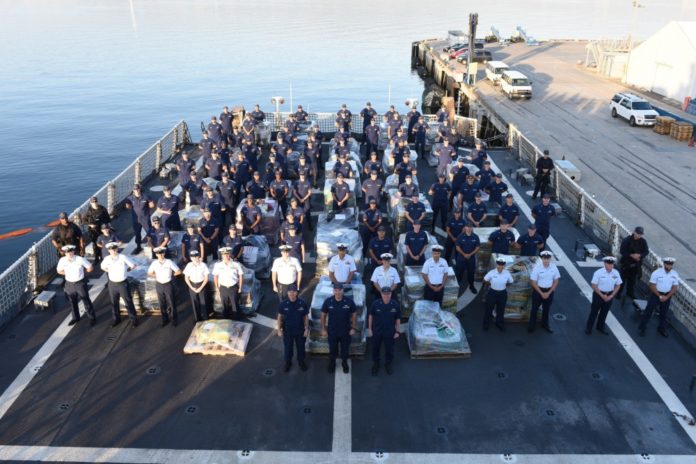
In San Diego on Thursday, January 25, the Coast Guard began to unload over 23 tons of cocaine seized from smugglers operating in the eastern Pacific.
Between November and January, Canadian and U.S. forces seized more than 47,000 pounds of cocaine. Officials said the seizures took place over 23 interdictions in operations conducted in international waters off the coasts of South American and Central American.
The estimated street value of the 47,000 pounds of cocaine seized by authorities is over $721 million. The Coast Guard began unloading the bundles of seized cocaine in San Diego on Thursday, piling bundles of the illicit substance on pallets on the Coast Guard Cutter Stratton’s deck as it was docked at the B Street Pier.
Seizures were conducted by multiple United States Coast Guard Cutter (USCGC) crews, including several cutters based along the west coast of the United States. Her Majesty’s Canadian Ship Nanaimo, based in Esquimalt, British Columbia, whose Canadian-U.S. crew seized more than $100 million dollars’ worth of cocaine. Cocaine was seized from traffickers who used a variety of different strategies to attempt to smuggle cocaine, including speed boats and submersibles.
The seized drugs will be surrendered to federal agents, who will use the cocaine to conduct investigations into those responsible for the drug trafficking, potentially leading to prosecution of those responsible. Afterwards, the seized narcotics will be destroyed.
In September, U.S. Attorney General Jeffrey Beauregard Sessions traveled to San Diego to praise the Coast Guard for the record-breaking amount of illegal drugs seized during the 2017 fiscal year.
As a result of the seizure, the cocaine will never make its way to the illicit market, thus ensuring it does not fuel crime or addiction on the streets of the United States. Furthermore, the cocaine seized may provide federal agents with the evidence they need to prosecute the drug traffickers responsible for the influx of illicit substances.















